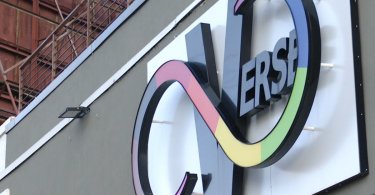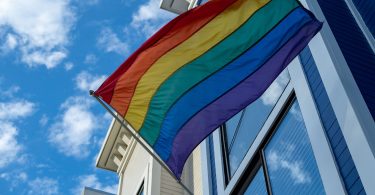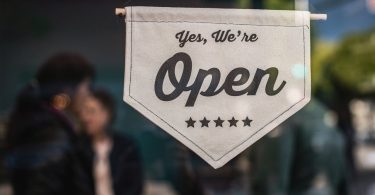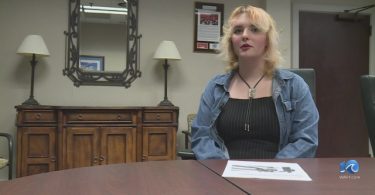Nearly 500 people gathered in Albuquerque for the 20th annual Queer Christian Fellowship conference Jan. 11-14.
The QCF conference is an opportunity for LGBTQ Christians, parents and allies to gather for workshops, speakers, worship and connection. The theme of this year’s event was “Renewal,” and the sentiment of rekindling and regeneration proved an apt descriptor for the experiences for both the attendees and the QCF organization.
QFC is one of numerous national organizations seeking to gather and support Christian community within LGBTQ identity. Some organizations are focused on theology or specific issues or identify with certain segments of American Christianity. QFC has carved out a more broad-based approach.
Matthias Roberts
Matthias Roberts, a queer author and psychotherapist who spoke at the conference, said QCF differs from queer organizations that connect solely around a set of common beliefs. So many organizations exist because they “have the same values around theology and sexual ethics,” he said, but QCF leadership and attendees “have a wide variety of differences” and may not “have the same values around theology and sexual ethics but we’re still connected by what unites.”
Paul-Anthony Turner, an ordained minister in the Christian Church (Disciples of Christ) who serves on the QCF board, said it took “deliberate planning” to create a truly inclusive environment. “I’ve been in other organizations nowhere near as centered on diversity and inclusion.”
According to Turner, QCF seeks the input and participation of people who have different ethnicities, denominations, worship styles and sexual ethics and views such diversity being brought into dialogue as “a beautiful thing” rather than “setting up boundaries to keep people out.”
Participating in a Saturday evening Pentecostal-style worship led by a Black bishop (Joseph William Tolton) complete with tambourines and dancing was “familiar to me as a Black person,” Turner said. Not only was the session a personal highlight, it also represented a level of inclusion he found “exciting.”
Q Live performers: Laura Beth Buchleiter, Mariah Keener, Flamy Grant, Samuel Ramsey and Rachel Francis
Other attendees pointed to Friday’s Q Night Live, a concert that included four queer singer-songwriters and headliner Flamy Grant as a high point. Author and BNG columnist Amber Wylde was one of those performers.
“Performing at Q Night Live this year was magical,” she said. “It provided the opportunity for me to come out of almost a decade of musical silence due to chronic illness and trauma and back into one of the things I love and find the most joy in. It was a moment of healing. It was a moment of renewal.”
Wylde said QCF offers an important outlet to showcase the talents of queer people who have been pushed out of other Christian spaces.
Mariah Keener, a singer/songwriter who works full time as the director of art and worship at South Bend City Church in South Bend, Ind., said she found rest at the conference. “The last several years have been quite exhausting,” but this year she experienced “a renewal of ‘this is who I am and I am OK to be me.’” Kenner said she left with a “sureness of the path” she’s on.
Mariah Keener
“As an introvert, walking into a space like that can be intimidating especially when you don’t know anyone,” said Keener, who was a first-time QCF attendee. “It’s quite unique to be in a space with people who understand your journey even if you haven’t shared it verbally. There’s a safety in that. I never experienced anything quite like it.”
The Saturday show provided Keener with an opportunity to play “Jesus Loving Queer Kid,” an autobiographical song she wrote about her coming-out experience. The lyrics pose the question: “What if I am like Jesus and you are the Pharisees, who remember all the rules and forget love intervenes?”
Keener said when she was coming out and having conversations with people she remembers thinking, “I am the same person you have always known; nothing has changed, except I am being open and vulnerable. I just kept wanting to scream, ‘What if you are wrong about all these things you are saying about me?’”
Author, podcaster and singles coach MaryB Safrit, another first-time attendee, said she immediately felt safe at the event, despite coming out even to herself just months ago. “I didn’t have to worry about how my queerness would be received, so I got to focus on letting myself ’be’ and making connections,” she said.
As part of its broader appeal, QCF has moved beyond previous conversations about choosing a Side A viewpoint — fully affirming support of loving same-sex relationships — or a Side B theology that recognizes queer identities while advocating for celibacy.
Myles Markham
“This year was representative of just how much the community has grown and diversified,” said Myles Markham, a queer, transmasculine film impact producer, development manager for Trans Lifeline and board president for Transmission Ministry Collective. Markham was a keynote speaker whose address reflected the broadening ethos of the organization.
This is a collaborative art project made from pieces of fabric that participants inscribed with statements about what they were bringing to the conference.
“I heard a number of straight people say how welcoming this organization has been,” Turner added. “Everyone is welcome and has a place. It speaks to the efficacy of what’s going on in the organization. It’s a way QCF shows the love of God. It’s so unusual to see. “
Identifying as a Christian can be “very loaded,” Turner said. He had a conversation with one attendee who doesn’t identify as Christian but said the conference was “one of, if not the, most meaningful religious experiences of their life.”
Still, Roberts notes boundaries have an important role to play amid openness and diversity. “One of the things I appreciate is still setting boundaries,” he said. “Coming together for the sake of unity is not necessarily healthy if we have unity above all.” He said it is necessary for there to be a balance of: “‘Where do you feel safe?’ ‘Where do you not feel safe?’ and can we prioritize both and the tensions that come with it?”
In summary, Markham said, “If QCF attendees are the folks who are preaching, teaching and leading our Christian communities, then and only then can I believe in the promise of a future church.”







